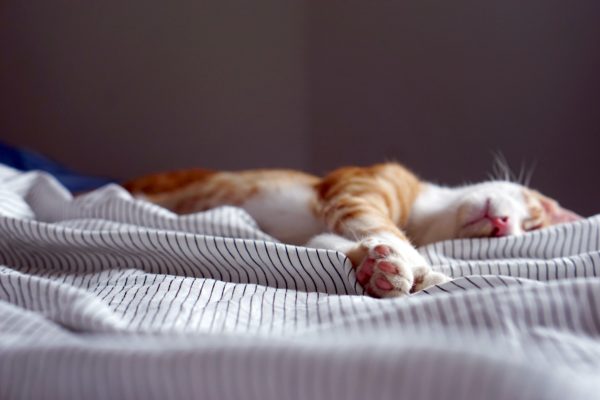Is Power Napping Good For You?
Is Power Napping Good For You?
The Advantages & Drawbacks of Power Naps During the Day
You may have been told that napping isn’t good for your nighttime sleep. “It disrupts your sleep cycle,” some people say. Power naps, when executed poorly, can cause poor nighttime sleep, but many health benefits are associated with taking your regular afternoon nap. In fact, power naps can be considered an essential part of healthy sleep. Here’s the science behind – and the pros and cons – of taking naps during the day.
What science says about healthy sleep

As you may know, sleep is as critical a bodily function as eating food and drinking water are. Your sleep cycle and its quality directly correlate to brain function and how efficiently your nerve cells communicate with each other.
Sleep deprivation has been linked to the development of numerous health conditions, like heart disease, type-2 diabetes, and early morbidity. It’s not just about sleep duration, either. It’s about sleep quality. Research suggests that sleep is integral to removing toxins in your brain that accumulate the more you are awake.
There have also been academic and medical associations with sleep that suggest a good night’s rest can regulate your body’s circadian alerting system and sleep-wake homeostasis, telling you when to feel tired and when to feel alert. With sleep deprivation, that balance is disrupted, and we can feel sleep deprived and groggy throughout the day.
What are the pros of a power nap?
A power nap is essentially the process of taking a quick nap during the daytime to recharge. Daytime naps have been associated with numerous health benefits and can help remedy poor sleep, such as improving cognitive performance, strengthening our immune system, and refreshing us after that post-lunch dip. Adults who took an average of 1-2 naps per week were associated with having a far lower risk of heart disease and strokes than individuals who did not nap and solely would sleep at night.
Short, occasional naps can help with cognitive flexibility post-lunch, especially for those who take their daytime nap a few hours into the day. Early afternoon is also an OK time to take a nap, but try to avoid napping after 3-4 pm, as at that point your nighttime sleep quality might take a hit. On the other hand, shift workers may greatly benefit from longer naps after finishing work or a few hours before beginning work.
What are the cons of power naps?

Just as research shows that taking the occasional short nap throughout the week is beneficial for your health, the flip side also shows negative impacts. When you nap later in the day and for longer, your nightly sleep can become impacted, resulting in less sleep and ultimately sleep deprivation.
Napping for too long can also become problematic, as it might result in you becoming unable to get enough sleep during the night (or going to bed too late) and creates a dependency where you cannot function during the day without frequent naps.
Although naps can boost alertness, they can also do so at inopportune times – like when we decide to take a nap at 4-5 pm just before dinner, and find ourselves unable to go to sleep later in the evening. This results in us staying awake too late and losing out on vital sleep during the nighttime. For better rest, opt for short naps early in the day.
It can be difficult to get into the deep sleep stage during power naps, which is one of the most restorative and crucial stages of sleep. Insufficient nighttime sleep due to too frequent napping or taking an extended power nap late in the day can make it difficult to get the quality of sleep we need to function throughout the day.
What is the best duration and time to take a nap?
Clearly, there’s a science to taking “the perfect nap.” For optimal cognitive function, most individuals (i.e., those who don’t work night shifts and are otherwise healthy adults) will benefit from short naps – between 30 minutes to an hour – taken early in the morning, either before lunch or just after. If you’ve had a day or a few days without optimal seven-to-nine hours of sleep, or you’re a shift worker who needs to sleep to recharge, then a longer nap might be OK.
Sometimes, bright light exposure can make it difficult for us to get that short period of napping we need. For your power naps, consider an eye mask to help you feel relaxed and avoid wasting time tossing and turning. Your nighttime sleep shouldn’t suffer if you’re timing your power naps well, listening to your body, and not becoming dependent on naps.
Can I take a power nap every day?
It depends. If you aren’t getting enough sleep during the night and your sleep health is suffering, i.e. because you’re a new parent, you’re a shift worker, or you are battling a serious health condition, it might be OK to take a power nap every day.
Napping two to three times a week might be good for your health, staving off sleep inertia and sleep disorders, and can help out those who might have had an insufficient sleep during the night. Naps should be relatively short and done earlier in the day. Try to avoid taking a nap every day if you can, as you might find yourself dependent on them and it can seriously impact productivity.
At the same time, if you find yourself “accidentally” taking naps at random, or dozing off while you’re at your desk at work, you may need to consult a health physician, as this abrupt need for a nap could indicate a larger health problem.
Again, these are just suggestions, and if you’re concerned about the quality of your sleep or if you feel you might be having trouble getting proper rest, get in touch with a physician or a sleep specialist.
Take a nap on a Sleep Firm bed
If you’re finding it hard to fall asleep on a soft or medium-firm bed with back problems, a firmer bed by Sleep Firm can you get a better night’s sleep. Fall asleep faster, on a bed that supports your body and spine with a firm mattress that will last you years. Contact our team if you have trouble sleeping on a mattress that isn’t firm enough for you.


 FREE & FAST Shipping*
FREE & FAST Shipping*